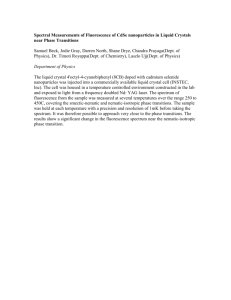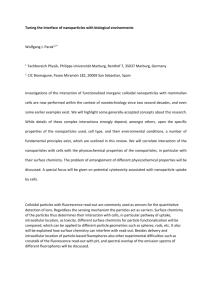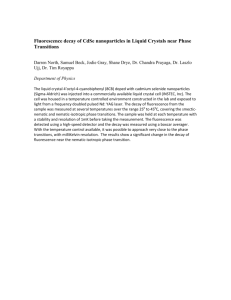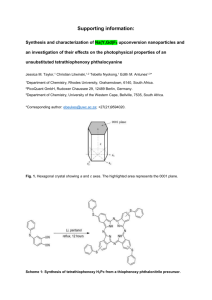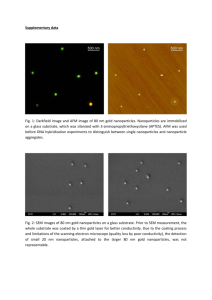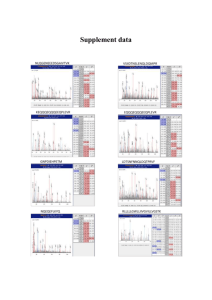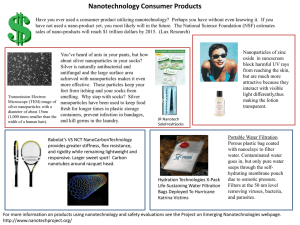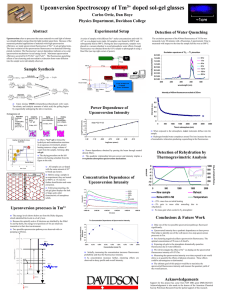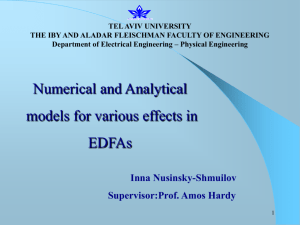Supplementary Information (doc 3068K)
advertisement
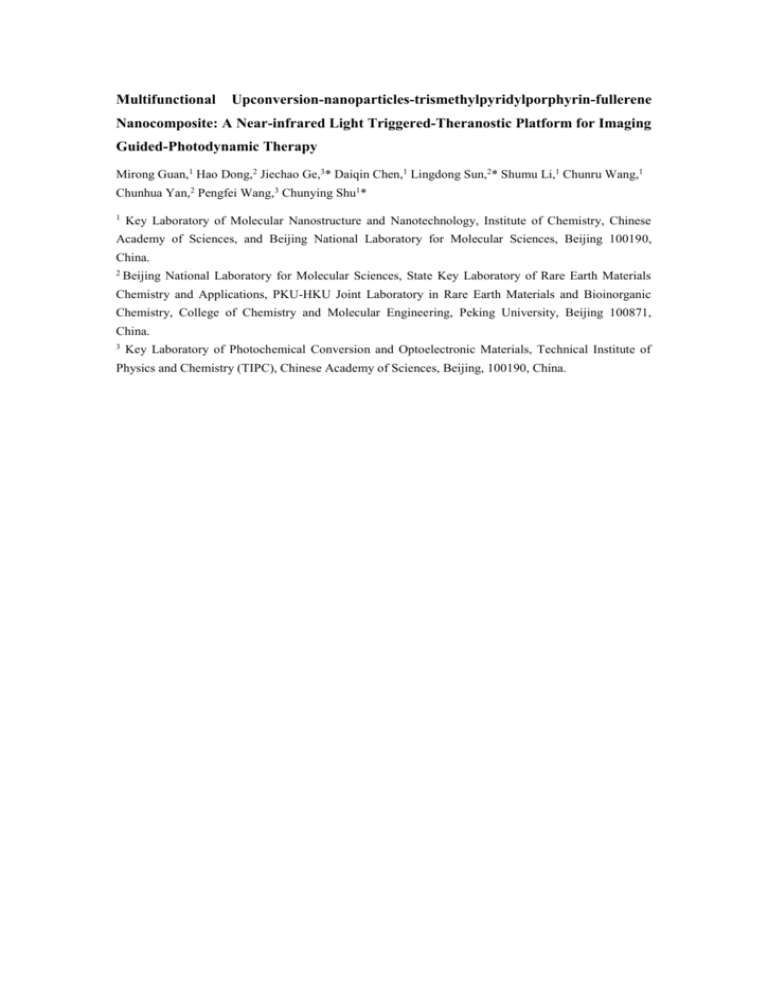
Multifunctional Upconversion-nanoparticles-trismethylpyridylporphyrin-fullerene Nanocomposite: A Near-infrared Light Triggered-Theranostic Platform for Imaging Guided-Photodynamic Therapy Mirong Guan,1 Hao Dong,2 Jiechao Ge,3* Daiqin Chen,1 Lingdong Sun,2* Shumu Li,1 Chunru Wang,1 Chunhua Yan,2 Pengfei Wang,3 Chunying Shu1* 1 Key Laboratory of Molecular Nanostructure and Nanotechnology, Institute of Chemistry, Chinese Academy of Sciences, and Beijing National Laboratory for Molecular Sciences, Beijing 100190, China. 2 Beijing National Laboratory for Molecular Sciences, State Key Laboratory of Rare Earth Materials Chemistry and Applications, PKU-HKU Joint Laboratory in Rare Earth Materials and Bioinorganic Chemistry, College of Chemistry and Molecular Engineering, Peking University, Beijing 100871, China. 3 Key Laboratory of Photochemical Conversion and Optoelectronic Materials, Technical Institute of Physics and Chemistry (TIPC), Chinese Academy of Sciences, Beijing, 100190, China. Content list: Scheme 1. Preparation of PC70 (Step 1) and UCNP-PEG-FA/PC70 (Step 2). Figure S1. TEM images of β-NaGdF4:Yb,Tm (left) and β-NaGdF4:Yb,Tm@NaGdF4 (right) nanoparticles. Insets are corresponding size distributions. Figure S2. Upconversion emission spectra of β-NaGdF4:Yb,Tm (green) and β-NaGdF4:Yb,Tm@NaGdF4 nanoparticles (blue) upon 980 nm excitation. Figure S3. TME images of citric acid modified β-NaGdF4:Yb,Tm@NaGdF4 nanoparticles. Figure S4. Upconversion emission spectra of oleic acid capped UCNPs (OA-UCNPs) and citric acid modified UCNPs (citric-UCNPs) at the same concentration. Figure S5. The size distribution of UCNP-PEG-FA/PC70 by DLS. Figure S6. Infrared spectra of PC70, UCNP and UCNP-PEG-FA/PC70. Figure S7. Loading capacities and release behaviors of PC70 in vitro. Figure S8. Fluorescence spectra of UCNP-PEG-FA/PC70 (red line) and PC70 (black line) excited at 428 nm. Figure S9. In vivo fluorescence images of mice at different time points after treatment with UCNP-PEG/PC70. Figure S10. Ex vivo fluorescence images of tumor and other organs after 24 h post-injection. Figure S11. Digital photographs of mice before and after 6 days treatment from different groups. Figure S12. Bioluminescence images of tumor-bearing mouse. Scheme 1. Preparation of PC70 (Step 1) and preparation of UCNP-PEG-FA/PC70 (Step 2).S1-S3 Figure S1. TEM images of β-NaGdF4:Yb,Tm (left) and β-NaGdF4:Yb,Tm@NaGdF4 (right) nanoparticles. Insets are corresponding size distributions. Upconversion emission spectra of β-NaGdF4:Yb,Tm (green) and β-NaGdF4:Yb,Tm@NaGdF4 nanoparticles (blue) upon 980 nm excitation. The upconversion emission intensity of Tm3+ enhanced 13 times after the epitaxial growth of the shell layer. Figure S2. Figure S3. TME images of citric acid modified β-NaGdF4:Yb,Tm@NaGdF4 nanoparticles. There is no obvious change in size and morphology of nanoparticles after ligand exchange. Figure S4. Upconversion emission spectra of oleic acid capped UCNPs (OA-UCNPs) and citric acid modified UCNPs (citric-UCNPs) at the same concentration. It is clear that the upconversion emission intensity of citric-UCNPs is only 1/6 times that of OA-UCNPs due to the quenching effect from the stretching vibrations of hydroxyl groups. Figure S5. The size distribution of UCNP-PEG-FA/PC70 by DLS. Figure S6. Infrared spectra of PC70, UCNP and UCNP-PEG-FA/PC70. Figure S7. Loading capacities and release behaviors of PC70 in vitro (a) Photographs of UCNPs solutions incubated with a gradient concentrations of PC70 and centrifuged for 30 min. (b) Release behaviors of PC70 in 10% FBS. Figure S8. Fluorescence spectra of UCNP-PEG-FA/PC70 (red line) and PC70 (black line) excited at 428 nm. Figure S9. In vivo fluorescence images of mice at different time points after treatment with UCNP-PEG/PC70. Figure S10. Ex vivo fluorescence images of tumor and other organs after 24 h post-injection. Figure S11. Digital photographs of mice before and after 6 days treatment from different groups: UCNP-PEG-FA/PC70 + 980 nm NIR light irradiation (a), UCNP-PEG-FA + 980 nm NIR light irradiation (b), PC70 + 980 nm NIR light irradiation (c), saline + 980 nm NIR light irradiation (d), UCNP-PEG-FA/PC70 (e) and saline (f) as controls. Figure S12. Bioluminescence images of tumor-bearing mouse. The images from left to right represent optical image, UCL image and merged image, respectively. References. S1. Mai, H. X., Zhang, Y. W., Si, R., Yan, Z. G., Sun, L. D., You, L. P., Yan, C. H. High-quality sodium rare-earth fluoride nanocrystals: controlled synthesis and optical properties. J. Am. Chem. Soc. 128, 6426-6436 (2006). S2. Yin, A. X., Zhang, Y. W., Sun, L. D., Yan, C. H. Colloidal synthesis and blue based multicolor upconversion emissions of size and composition controlled monodisperse hexagonal NaYF 4:Yb,Tm nanocrystals. Nanoscale 2, 953-959 (2010). S3. Bogdan, N.; Vetrone, F.; Ozin, G. A.; Capobianco, J. A. Synthesis of ligand-free colloidally stable water dispersible brightly luminescent lanthanide-doped upconverting nanoparticles. Nano Lett. 11, 835-840 (2011).
